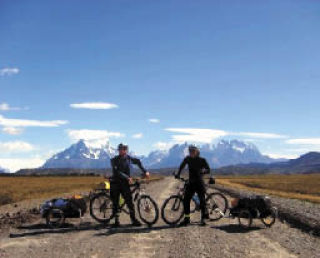Mount Si high school graduates Thomas Schultz and Zach Hoyopatubbi are on the adventure of a lifetime, touring the South America on two wheels.
The pair are wrapping up a four-month journey by bicycle, traveling from the southernmost tip of the continent, up the length of Chile.
“We’ve been on the road since the first of February” and have gone several thousand kilometers, the two men wrote to the Valley Record by e-mail.
“The desire to do this trip came from the need to get out and see and experience something new,” Schultz and Hoyopatubbi stated.
Both worked and studied full time for the past several years, and decided that the trip would be a good way to take a break from everyday life.
Their trip is teaching the men to take the time to enjoy all the small things in life and that nothing is out of reach.
“The sights are incredible,” the men wrote. “The flora and fauna are completely 100 percent different than anything we have in the United States. The trees, plants, animals — all different.”
Each day, Schultz and Hoyopatubbi ride past herds of guanacos, a relative of the llama, and groups of rheas, a flightess, ostrich-like bird. They see condors flying overhead, hawks, foxes and huge rabbits. Crossing the Straits of Magellan by ferry, the riders spotted penguins, porpoises and whales.
Patagonia, in the deep south of South America, “the land still remains untouched, for the most part,” the pair wrote. “It is referred to as La Frontera, the frontier, and that’s exactly what it is.”
The people of South America have been warm and friendly.
“Most places we’ve been to, people are incredibly hospitable and understanding,” Schultz and Hoyopatubbi wrote. They’ve also met a lot of travelers, old and young, on bus tours, backpacking or biking.
“It’s really interesting when you consider how many people are on trips down here,” they wrote. “You cross into their paths, maybe just for an instant but you´re able to get a glimpse into their lives and why they are here, it´s amazing. It´s a great thing to travel and experience something foreign.”
Food on the journey has run the gamut from delicious to generic.
“For us, the cheaper, the better,” they wrote. “We have managed, on several occasions, to experience true homestyle cooking from the region.”
At a hostel in Rio Grande one night, the owner decided to prepare a traditional stew from scratch. On another occasion, they bought cordero, or veal, and grilled it over a fire. They also discovered local microbrews in Chile and Argentina. Good wine is expensive there, though.
Most restaurant menus are remarkably similar to U.S. cuisine.
“It took a long time trying to figure out what everything was, a true trial and error kind of learning experience,” the pair wrote. “We learned that people down here love mayonnaise. We’re not fans by any means.”
By cycling, instead of taking a bus, “if we see something beautiful, we have the option of stopping to take a look or photograph it,” the men wrote. “Time slows down while riding. You lose track of the days, and all that matters is riding as far as you can that day. You pitch a tent, cook some food, and head to bed when the sun goes down.”
So far, the riders escaped any major bodily injury.
In the Torres del Paine National Park, both were flipped backwards over their bike trailers by severe winds. They came away with a scraped elbow and a good laugh. With winds gusting nearly 60 mph, “it’s just not possible to ride. We were pushing our bikes.”
Schultz was sick with a cold when the journey began, and battled a cough, a sore right knee and a swollen Achilles tendon along the way. Pains in Hoyopatubbi came and went.
To keep family and friends up to date on their journey, the pair try to update their Web blogs each time they enter a new city.
Both cyclists offered thanks on their journey to Mount Si High School teachers who taught them valuable skills. Maria Scott gave Hoyopatubbi a strong base for Spanish language. Without the three years in her class, “it would have been much harder getting around down here,” he said.
Schultz said Mount Si photography teacher Jim Gabowski gave him both camera and life skills.
With their trip, Schultz and Hoyopatubbi are promoting Futafriends, a nonprofit group seeking to preserve the Futaleufú River, which is being threatened by hydroelectric and mining ambitions.
“Our main mission is to capture these magnificent areas at their pivotal moments in time, with both camera and journal,” the two wrote. “We hope to bring more attention to these threatened areas and make people aware of their beauty and importance to future generations.”
Learn about Thomas Schultz and Zach Hoyopatubbi’s trip by visiting their Web site, www.bikechile2009.com. Hoyopatubbi’s blog can be read online at www.bikechile2009.blogspot.com. Learn more about the Futaleufú River at www.futafriends.org.



